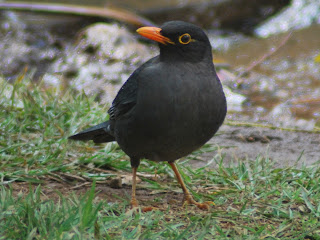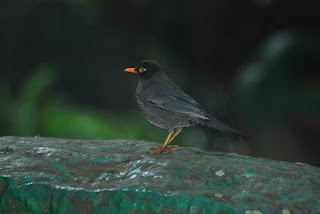A peculiar little bird –that was once referred to as Fantail warbler- about the size of sparrow found in plains and bushy terrain. It prefers a kind of sedentary lifestyle and therefore becomes difficult to spot, save for the fact of its amusing flight that draws attention. It shoots up and flies a distance and falls straight back into the bush. This bird makes a delicate and beautiful nest composed of cobwebs, growing grass and even vegetables. The chicks are known to make hissing noise –like that of a snake – when disturbed.
The invincible Coorg of Western Ghats:
Chakke kari
Chada, chada, beva.
Kambala kari
Guda, guda, beva.
Translation
When the fruit of jack tree boils
It sings “chada chada”
When the kambala fruit boils
It sings “guda guda”
Very few Indians except maybe the Kannadigas know much about the Kodavas (Coorg). Unless of course if you have spend some time in Armed forces. Kodavas pride themselves for being warrior class. Coorg is a tiny district tucked away in the south west Karnataka bordering Kerala (this blogger had covered the yearly traditional family hockey -played between clans within Kodavas- almost 5years back). Coorg a fertile land with bounties of nature that kodava song or palame almost always opens with, expression of delight for the pleasant land they dwell that provide them with all material prosperity and comfort.
Nothing higher can be seen,
Though one look through all the earth
Than the Mahameru hill.
Brightest amongst the flower trees
Is the brilliant Sampige.
So in all the fertile earth
Coorg a necklace is of gold.
Some children’s rhymes translated (it need be pointed out that all these poems are wonderful rhymes in original, that has playful nature embodied in its construction)
The fingers
The little finger nail is small,
The finger for the ring is gold,
The middle finger loves coins,
The fourth is Kotera,
The thumb is Murutika,
And both are gone for cheese.
Colors
The mother is black,
The daughter is white,
And the grand-daughter is like gold !
Little chickens
An old story, an old story !
Clever Brahman, an old story!
What shall i say?
I know none.
Little chickens! Little chickens !
Sing me a song!
What can i sing?
Pyong ! Pyong!
Coorg Huttari or Harvest Song
Sun and moon the season make,
Ruler over all the sky they take.
God is lord of heaven and earth.
All the joyous earnest toil
happy ryots give the soil,
our rich land is fully worth.
midst the beauteous forest trees
brightest to the eye that sees
is the brilliant Sampige
sweeter than sweetest rose,
purer than the mountain snows,
better than mere words may say
thus is Coorg the noblest land,
rich and bright as golden band
on the neck where youth doth stay
in this happy lovely realm
no misfortunes overwhelm.
Live and proper while you may !
“A stanza from different huthri
Come on, friends, lets all sing louder
Let all our bunches of canes clatter;
Come on sing all, louder and louder,
Let the gods in high heavens too hear”
Listen how the sound resounds all over,
The country’s cream of youth is here;
That one legged man too moves around,
Those squint eyed women and the blind.
Either in or off the field, all are dancing,
And a large crowd is excitedly watching”
The above song consist of words that rhymes with the rhythms of clattering cane sticks.
Gods here come from Kerala!!!
 Iguthappa temple in Coorg is a prominent place of worship for Kodavas located near salubrious Kakkabe. Iguthappa the main deity of the temple is also the chief divinity for Kodavas, iggu in kodava is grain and thappa means to give. It looked like a temple that seems to evoke favor with snake gods.
Iguthappa temple in Coorg is a prominent place of worship for Kodavas located near salubrious Kakkabe. Iguthappa the main deity of the temple is also the chief divinity for Kodavas, iggu in kodava is grain and thappa means to give. It looked like a temple that seems to evoke favor with snake gods.Coorg is a pleasant place to roam around charmingly green and agreeable people. So while I was in Medikeri took a bus to Kakkabe, at a tea shop I asked a man, who not surprisingly happened to be a Malayali, about Iguthappa temple and presiding deity and so on. Since there was ample time –as the buses are infrequent in this part of the world –he got talking. He said, what I thought was a hilarious irony, gods here come from Kerala. He winked, probably realizing there is a humor here, and next few minutes narrated to me rather excitedly about Igguthappa who had left Kerala because he found the climate at Coorg agreeable (surely a godly enough reason!!), he was accompanied by his brothers and sister. Tired by walking for days they camped near Kakkabe, they milked the stray cow and with the rice they were carrying prepared payasam. They needed plate so they asked the owner of the property for plantain leaves who angered by the intrusion refused. Iguthappa did what gods are good at –atleast in this part of the world, he cursed. Henceforth no plantain will grow in the property; it remains so to this day. It is stuff that makes miracles I guess. All important dates are ascertained by the priest through Kerala Panchang system.
The bus halted at the dead end on the edge of the hill at the entrance of the temple, further up seemed like forest that I came to know later was Aiyengeri forest. The surroundings of the temple are sparsely inhabited by people who are into coffee and other plantations. There was a small crowd in the temple, seemed like monthly gathering or something of that sort. Famished and tired the free refreshments at the temple courtyard caught my unadulterated attention, after the fill I explored the place. You could mistake yourself to be in Kerala, the temple is in typical Kerala architect – that itself was influenced by early Buddhism. Deepastambam, vilakumadam so on, low lying triangular roof and space around the main shrine (chuttabalam) for people to rest. Like temples in Kerala devotees waited for the priest to open the nada and peek in from a rather narrow door. After an hour or so the deity was taken out for a procession around the shrine. Now this is where the Coorgy flavor overtakes and differ much from Kerala. As soon as the
idol is taken out for procession instead of stern demeanor the priest is expected to maintain, as is the case in Kerala temples -sometimes these are carried on elephants with accompaniments of nadaswaram and chenda in almost businesslike manner. The priest start a jig to my utmost consternation, he put a step here and a step there and rushed as abruptly, with the idol still mounted on his head, to one corner of the premise, while the acolytes cautioned the crowd to give way. As abruptly he started he halted at one end of the courtyard as a woman whispered her woes the priest was instant with his solution, others joined in. This went on for much of the noon as the priest circumnutated the devotees, halting for those in immediate need of favor.
Lunch was arranged at the adjoining hall, devotees backed up as volunteers and everything handled in clockwork precision. After the lunch –spartan but delicious, I decided to walk back the verdant route, about a Km or two down caught up with a bus and was back in my hotel by the evening. Late into the night a thought start to pervade my mind…Coorg could be the place I might finally settle down!! But on a second thought you can only settle if you are unsettled!!
From my scribble pad...
Little girl in the garden
She talks to the flowers
and to herself, and the damselfly
and all that there is to talk to
of course she realises
that language never been a barrier
everything right in its place to be picked.
and arranged into her world.
A gaiety the tiny body carries
much beyond herself,
one step back, a step in front
dance she beget and forgotten at the instance.
In the late noon of her life
when time has signalled its triumph
she will recall that everything was right in the garden
.











